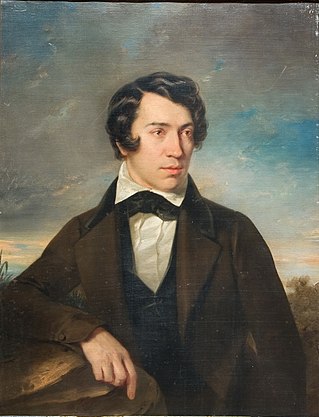
Novodevichy Cemetery is a cemetery in Moscow. It lies next to the southern wall of the 16th-century Novodevichy Convent, which is the city's third most popular tourist site.

Nikolay Mikhailovich Karamzin was a Russian historian, romantic writer, poet and critic. He is best remembered for his fundamental History of the Russian State, a 12-volume national history.
Slavophilia was a movement originating from the 19th century that wanted the Russian Empire to be developed on the basis of values and institutions derived from Russia's early history. Slavophiles opposed the influences of Western Europe in Russia. Depending on the historical context, the opposite of Slavophilia could be seen as Slavophobia or also what some Russian intellectuals called zapadnichestvo (westernism).

Sergey Timofeyevich Aksakov was a 19th-century Russian literary figure remembered for his semi-autobiographical tales of family life, as well as his books on hunting and fishing.

Ivan Sergeyevich Aksakov was a Russian littérateur and notable Slavophile.
Aksakov is a surname of Russian origin. The feminine version of this surname is Aksakova. Notable people with the surname include:

Konstantin Sergeyevich Aksakov, a Russian critic and writer, became one of the earliest and most notable Slavophiles. He wrote plays, social criticism, and histories of the ancient Russian social order. His father Sergey Aksakov and his sister Vera Aksakova were writers, and his younger brother, Ivan Aksakov, was a journalist.

Aleksey Stepanovich Khomyakov was a Russian theologian, philosopher, poet and amateur artist. He co-founded the Slavophile movement along with Ivan Kireyevsky, and he became one of its most distinguished theoreticians. His son Nikolay Khomyakov was a speaker of the State Duma.

Mikhail Petrovich Pogodin was a Russian historian and journalist who, jointly with Nikolay Ustryalov, dominated the national historiography between the death of Nikolay Karamzin in 1826 and the rise of Sergey Solovyov in the 1850s. He is best remembered as a staunch proponent of the Normanist theory of Russian statehood.

Ivan Vasilyevich Kireyevsky was a Russian literary critic and philosopher who, together with Aleksey Khomyakov, is credited as a co-founder of the Slavophile movement.

Russian philosophy is a collective name for the philosophical heritage of Russian thinkers.

Stepan Petrovich Shevyryov was a conservative Russian literary historian and poet, a virulent critic of "the rotting West", and leading representative of the Official Nationality theory.

Russkaya Beseda was a Russian literary magazine founded in Moscow, Russian Empire, in 1856 by Alexander Koshelev who remained its editor-in-chief until 1858, when Ivan Aksakov joined in as co-editor. The magazine was published on a bi-monthly basis and was belonged to the Slavophile movement; most prominent in it were the literature, science and criticism sections. Selskoye Blagoustroistvo was added as a supplement in 1858–1859. Russkaya Beseda targeted for broad and mixed readership and but, frequently covered articles about the future of the Slavic peoples. Among the authors who regularly contributed to the magazine, were Sergei Aksakov, Vladimir Dal, Aleksey K. Tolstoy, Alexander Ostrovsky, Aleksey Khomyakov, Fyodor Tyutchev, Ivan Nikitin, Taras Shevchenko. It ceased publication in 1860.

Emmanuil Aleksandrovich Dmitriev-Mamonov was a Russian portrait painter and graphic artist. He also worked as a book designer and caricaturist and was a respected art historian who supported the Slavophile movement.
Events from the year 1860 in Russia

Vera Sergueïevna Aksakova or Vera Axakova was a Russian writer known for her diaries at the time of the Crimean War in a Slavophile family.
This page is based on this
Wikipedia article Text is available under the
CC BY-SA 4.0 license; additional terms may apply.
Images, videos and audio are available under their respective licenses.













